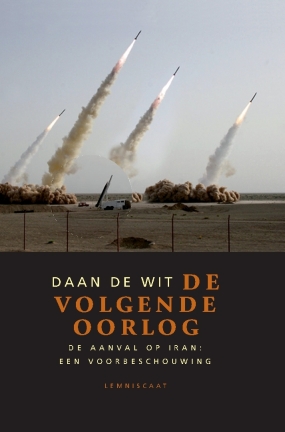|
Politicians and the media disregard facts in Iran report
By Daan de Wit
Translated by Ben Kearney In an article responding to the report released by the IAEA CNN headlines: 'Iran developing nuclear bombs'. Media and politics worldwide make bold statements as to what to do about the Iranian 'situation'. But what are the facts? After reading the IAEA report, two former Middle East experts at the U.S. National Security Council, Flynt Leverett and Hillary Mann, wrote that there is still no one - the drafters of the report included - who has 'ever produced a shred of evidence that Iran has ever actually tried to build a nuclear weapon or taken a decision to do so.' The discrepancy that exists between the frenzied opinions of the MP's and the facts as presented by Leverett and Mann, as well as the facts detailed in my book The Next War and in this DeepJournal series on Iran, is quite large.
Nobel Prize winner Mohamed ElBaradei, former head of the IAEA, refused to make use of any intelligence that he had not personally gathered himself. This is something that his successor at the IAEA, Yukiya Amano of Japan, has shown no trouble doing. The Guardian read through the U.S. embassy cables concerning his narrowly won appointment that were leaked by WikiLeaks and, quoting the Americans, headlined: 'New nuclear chief a 'once-a-decade' chance to shake up UN bureacracy'. American diplomats note enthusiastically that their first meeting 'illustrates the very high degree of convergence between his priorities and our own agenda at the IAEA.' The well-informed Flynt Leverett writes: 'An October 2009 cable from the U.S. mission to the IAEA, published last year by Wikileaks, see here, reported that Amano had “reminded [the U.S. Ambassador to the IAEA] on several occasions that he would need to make concessions” at times to developing countries, “but that he was solidly in the U.S. court on every key strategic decision”, including “the handling of Iran’s alleged nuclear weapons program.”' Justin Raimondo, who has been following the Iran story even longer, correctly writes that: 'While the report attributes its information to “Member States,” why will I not be surprised if this “intelligence” comes from the same folks who brought us the Niger uranium forgeries?' 'Member states' for all intents and purposes means Israel and the U.S., countries that are highly invested in the issue. Writing about the content of the report, Raimondo says: 'If you wade through the International Atomic Energy Agency’s much-awaited report [.pdf] on Iran’s alleged pursuit of nuclear weapons technology – a fate I wouldn’t wish on anyone – what you’ll find is a studious ambiguity. “May,” “might,” and “could” are words that modify practically every assertion of Iranian perfidy.' On this score Leverett points out that nothing that Iran is doing in the nuclear arena in any way violates the Non-Proliferation Treaty. Iran rejects the new allegations made in the IAEA report, denies aspiring to possess a nuclear weapon - it has in fact even issued a fatwa against it - and says it is working on nuclear energy. This piece of information is often met with skepticism considering the extent of the country's oil and gas reserves, but it is questionable just how warranted this skepticism is, given the recent news that oil producer Saudi Arabia will be building 16 nuclear reactors.
DeepJournal
Sign up for the free mailing list. |
|
9 September 2013
Why is Syria under attack? - Part 4
‘Syria’ is about power, money, influence and energy
8 September 2013
Why is Syria under attack? - 3
Syria and Iran are like pieces on a geopolitical chessboard
7 September 2013
Why is Syria under attack? - Part 2
On the interests of the parties involved in the Syrian conflict and the role of the media
6 September 2013
Why is Syria under attack? - Part 1
Who is behind the chemical weapons attack in Syria?
1 April 2013
Albert Spits: Creëer je eigen financiële veiligheid
Beluister het interview
|




 'The evidence that the International Atomic Energy Agency (IAEA) claims to possess on an Iranian nuclear weapons program is fabricated',
'The evidence that the International Atomic Energy Agency (IAEA) claims to possess on an Iranian nuclear weapons program is fabricated',